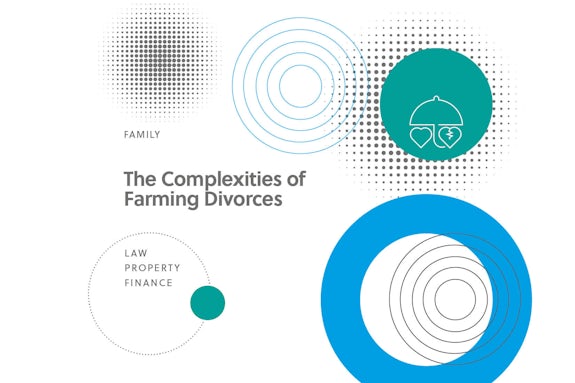When a couple separate, under Scottish Law the net value of the assets is divided fairly which usually means equally. As Family Law Solicitors we deal with the financial aspects of separation on a daily basis with the most common financial claims including Property sale or transfer, Pensions, Investments as well as business interests. Taking a somewhat broad view, achieving a financial settlement that is fair and reasonable is usually fairly straightforward but for farmers in particular, when separating, the financial aspects can be particularly daunting with particular specific complexities and difficulties.
Farming divorces are altogether a different species. Any farmer will tell you, is not just a job it is very much a way of life, for some a vocation. For many, the family has been farming for generations often with complex legal structures.
So what are these complexities?
What is the farm?
The assets which make up the farming business will comprise farmland, buildings, livestock, machinery and equipment. Early clarification on the specific business structure of the farm is necessary to get a clear picture of the finances. The farm might also be owned with family members or farmland may be rented out to tenants to generate an additional income. Aside from a commercial viewpoint, the farming business is usually not just a place of work -it is the family home and, in most farming marriages, an inter-generational asset. It may well have been inherited by one spouse but thereafter invested in and maintained by both. Emotional ties will be common place.
Is the farm a matrimonial asset?
The starting point will always be – is the farming business or any part of it a matrimonial asset? On the face of it that might seem an easy question to answer but in reality it’s often not that straightforward What if the farm is inherited, is part of a trust or is owned with other family members? Any assets inherited or gifted to either spouse by third parties are excluded from the matrimonial ‘pot’ of assets to be divided but if the farming business been restructured or changed during the marriage, such as business restructuring or a farmer selling land previously gifted or inherited prior to the marriage and applying the sale proceeds to the purchase of another farm or plot of land can mean what was a non-matrimonial asset will become matrimonial.
Often farms are passed from one generation to the next. If part or all of the farm has been inherited by one spouse, it is likely that that part of the farm will not be subject to fair sharing principle should there be a divorce. However, the needs of both spouses and the children of the family will still need to be taken into account particularly where, in the interests of the marriage or the family, one spouse has been disadvantaged by loss of capital, income and earning capacity. In such a scenario a claim can be made under s 9(1) (b) of the Family Law (Scotland) Act.
This leads us on to consider how any settlement might be funded. What I imagine the priority of many farm owners to be, is the continued running of their business ensuring future viability. This will undoubtedly raise lots of questions, Will land have to be sold? Will the farming business still be viable? How readily can capital be raised? A detailed look at the resources of the parties and detailed information will be required from banks, accountants and other experts in relation to raising capital.
The case of Bradbury v Bradbury highlights all of these thorny issues. in that case, the defender’s interest in Fairbanks Farm in Lancashire was partially gifted to him prior to the marriage and partially as a result of a capital payment made by him. After the marriage the parties lived there until 2010 when they sold the property for £2.6 million and purchased Satchells in the Scottish Borders. There was no material dispute as to the overall value of the net matrimonial property in this case, (£2.9 million) but the defender husband concentrated instead on his source of funds argument, namely that the expansion of his farming enterprise and the purchase of Satchells farm was all derived from the proceeds of sale of Fairbanks Farm which was non matrimonial and the division of assets should be weighted in his favour.
In determining matters the judge took into consideration a range of factors. It had been a long marriage and the pursuer wife made a significant contribution to the defender’s farm and business in addition to the running of the family. There was a “persuasive argument” for equal sharing but what could not be ignored was that significant capital reserves released by the sale of non-matrimonial property meant that a significant element of expansion of the farming business was attributable to the investment of the proceeds of sale on non-matrimonial assets. Ultimately, the judge did not feel that this was a case where it would be fair to divide the value equally which is what the pursuer sought, instead he awarded her a capital sum of £900,000 together with periodical allowance at the rate of £2,000 per month until payment of the capital sum had been made.
Many separated spouses will say that the benefit of hindsight is a wonderful thing, but it really is true that prevention is better than cure. Ultimately, the best way to protect farming assets is to consider the use of pre or post nuptial agreements to give protection when planning the passing of assets down the generations against them being lost from a family due to a future divorce settlement. While it isn’t particularly romantic it does provide financial certainty in the event of separation and divorce and will protect assets.








